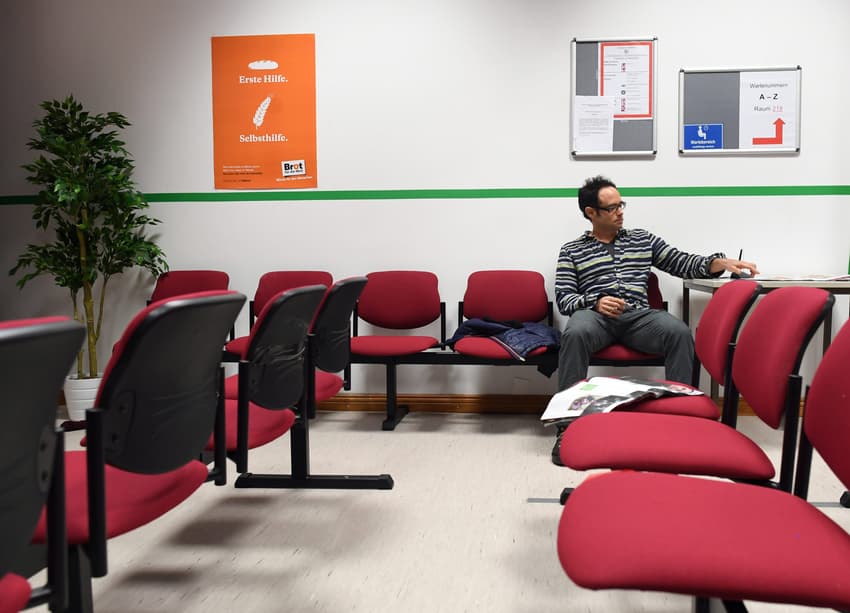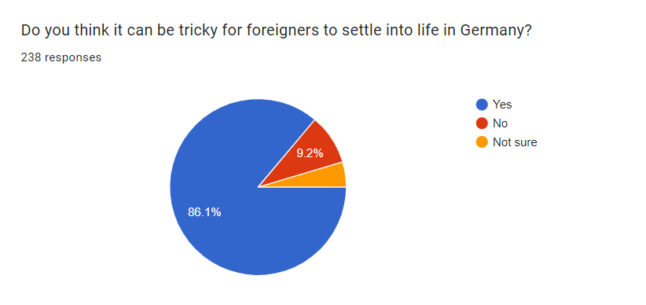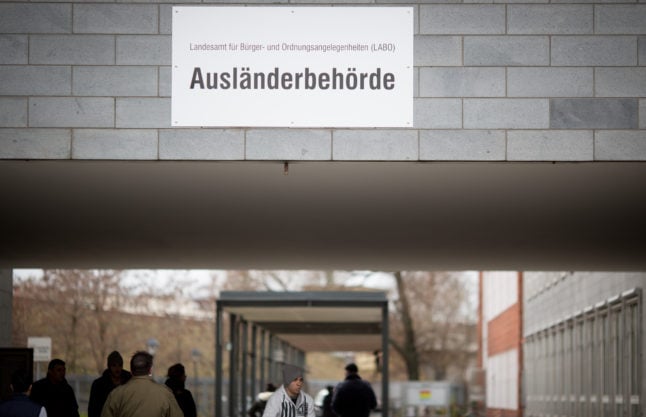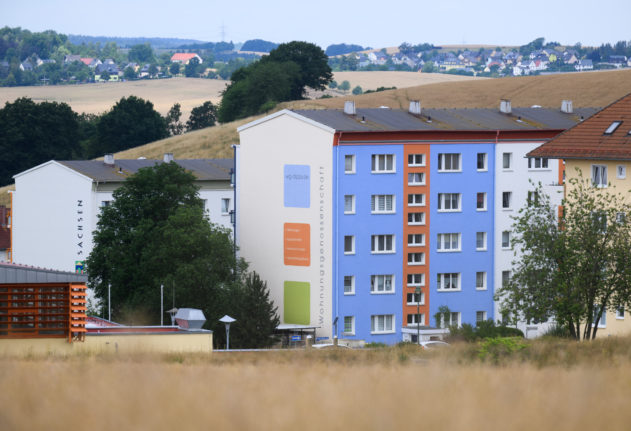'Nothing is easy': How foreigners in Germany struggle to settle

According to a recent study, internationals in Germany are massively underserved when it comes to essentials like housing, digital services and language provisions. Here's what our readers had to say about it.
Germany is a hugely popular destination for expats, who are often lured by the healthy jobs market, high salaries and decent quality of life. But while many internationals expect to turn up in a country that runs like clockwork, many are shocked to find that things aren't quite how they imagined.
It may be that Germany's forward-thinking reputation isn't borne out by its lagging digital services - or that language barriers make it impossible to break into German social circles. For most people who move to the Bundesrepublik, at least one aspect of settling in is hard.
This was reflected in a recent survey by InterNations, in which Germany was ranked 42nd out of 52 countries as a destination for expats. Even though factors like a good work-life-balance were applauded, in the newly added Expat Essentials categories - which focuses on admin, housing, language and digitalisation - Germany was the worst-ranked country of all.
READ ALSO: Germany ranked as 'worst country in the world' for expat needs
When The Local conducted its own survey where almost 240 respondents replied over two days, many of these topics came up as bugbears for the international community. Asked whether it was tricky to settle into life in Germany, a whopping 86 percent said yes, while nine percent said no, and the remainder were unsure.

Source: The Local
Here were the four major issues that foreigners have to grabble with when trying to settle in Germany.
Language barrier
By far the biggest issue for many internationals is the fact that they are thrown into the deep-end with interacting in German straight away.
"I was lucky in many ways, because friends helped me," said 53-year-old Ingrid, who's based in Berlin. "I knew a little German, but it was hard to fill out forms. I would never have managed alone. No-one speaks English! Nothing available in English either, like forms or written information."
For 28-year-old Tanvir Rahmen Ovi, who lives in Kiel, it was also hard to get support in English.
"I knew on the first day that I would not get help from anyone if I couldn't speak German," he said. "Almost everywhere I went, people refused to speak English."
Tanvir told us he experienced a "scary" situation after mislaying his wallet on a bus and seeking help at the lost and found. "To my utter surprise, the man in charge of handling things refused to speak English and said, 'This is Germany! No English,' and yes, he said that in English. I wasn't able to collect the wallet on that day. This story is just one out of many bad experiences I can share."
Several people said they had negative experiences during their registration appointment at the Bürgeramt or when dealing with the Ausländerbehörde (immigration office) largely due to the fact that few people were willing to speak English with them (or were unable to).
"I can understand other government offices where you need to speak German, which is fine, but at the Ausländerbehörde?", said Thomas, 45, from Bonn. "Of course you will have people who don't speak German coming to the Foreigner's Office. I think its time to have younger English-speaking workers in such places."
Leo, 42, who lives in Neusäß in Bavaria, said newcomers should get more English language support in Germany.
"To be honest, I really think that Germany should ask foreigners to learn the language, perhaps even make it an obligation," he said. "But it has to help at the beginning."
READ ALSO: The pros and cons of living in Germany
Bureaucracy
Closely related to the language issues is the mountain of bureaucracy that foreigners have to climb - which many of our readers named as one of the hardest parts of settling into German life.
"Nothing is easy here," said Siva from Königswinter. "Take anything and everything - it's difficult in Germany."
Nour in Seligenstadt described the bureaucracy as "crippling", while Tom in Bonn said the level of paperwork he had had to deal with was "unbelievable".
The major issue with Germany's bureaucracy for many expats was the fact that so much administration work has to be done in person or even by post. Digitalisation - or the lack of it - came up time and time and again as one of the major headaches of living in Germany.

The entrance to the Foreigner's Office (Ausländerbehörde) in Berlin. Photo: picture alliance / Kay Nietfeld/dpa | Kay Nietfeld
"The appointment system at the Ausländerbehörde is not at all organised," said 22-year-old Yash Trivedi, who lives in Wildau. "They are still trying with the digitalisation but if you have any questions, they neither pick up the call nor answer any emails. You have to wait for months before your appointment and still everything relies on letter rather than getting all your official documents by email."
Darmstadt resident Khan, 30, agreed that "most things should be done online" rather than at the various administrative buildings.
"It is hard to get started because of slow and repetitive bureaucratic processes," he said.
READ ALSO: Fact check: Is Germany’s internet really that bad?
Finding a flat
The other area where many foreigners struggle is Germany's competitive housing market, with many saying they felt discriminated against because they have non-German names.
"It’s extremely hard to find a flat and people usually take advantage of foreigners with extreme prices," said 33-year-old Liliana, who lives in Munich.
"Finding a flat in Berlin currently is hard," another respondent told us. "It's a game of handling expectations: if you want to go further from the city centre, it's a little easier. But then, life is harder for you if you can't speak German."

A housing co-op in Saxony. Foreigners say it's hard to find a secure place to live in Germany. Photo: picture alliance/dpa | Robert Michael
And it's not only Berlin and Munich where the situation is tense: people all over the country, from Stuttgart to Rostock, complained of how difficult it was to secure a roof over their heads.
"Finding housing in Hamburg is extremely hard to impossible, if you don't want to settle for suburbs," 27-year-old Isabel told us. "I was lucky to find a place in the city, but there is a cost for that, and that is I don't get to save much after paying the rent. I know at least five people who have been searching for months without any luck now. It is a battlefield."
Even more worryingly, a number of respondents spoke out about the discriminatory treatment of ethnic minorities on the German housing market.
"Flat finding in Berlin is traumatic, especially if you aren't European or American," 30-year-old Muzaffer told us. As a skilled employee with a decent salary, Muzaffar said he had had to apply for more than 500 flats before he managed to secure one.
Düsseldorf resident Fawaz, 31, had a similar experience while flat-hunting.
"I’m an Arab expat and the second they see an Arabic name I don’t get apartments, not even interviews for apartments, even though I speak German and have a high paying job," he said. "It’s really sad to be honest."
READ ALSO: High costs, long queues and discrimination: What it's like to rent in Germany
Difficulty of finding friends
Beyond the day-to-day stresses of life admin and looking for flats, our readers told us that they struggled to find German friends and feel fully accepted in German society.
Some said they felt that Germans in general were "cold" and "unfriendly", while others said they thought many locals were unwelcoming to foreigners.
"I have settled in fairly easily, since I already had a good grasp of German language," said Richard Howard, 73, from Wiesbaden. "However, I have found it difficult to make friends and to connect with people. Germans can often appear distant, cold and rather arrogant, unwilling to engage. But to be fair they may be no worse in this respect than others, such as the Brits."

A man and his dog sit on a bench in Frankfurt am Main. Many foreigners say loneliness is an issue in Germany. Photo: picture alliance/dpa | Frank Rumpenhorst
Francesca, 31, who lives in Tübingen, said she had also found it hard to build up a social circle.
"Despite spending the last five years with the same female sports group, I could not make any German friends," she said. "But I can't say whether it's an issue of those people against foreigners, a female issue, or just an issue of being Swabian.
"However, since I moved to Germany, I have always lived in the same (small) town, so my experience may not reflect reality. I plan to move to a different, bigger city in the future, and I hope things will improve."
Thank you to everyone who took the time to fill out our survey. Keep a look out for upcoming features on what can be improved for foreigners in Germany, and the positive aspects of life in the Bundesrepublik.
Comments (1)
See Also
Germany is a hugely popular destination for expats, who are often lured by the healthy jobs market, high salaries and decent quality of life. But while many internationals expect to turn up in a country that runs like clockwork, many are shocked to find that things aren't quite how they imagined.
It may be that Germany's forward-thinking reputation isn't borne out by its lagging digital services - or that language barriers make it impossible to break into German social circles. For most people who move to the Bundesrepublik, at least one aspect of settling in is hard.
This was reflected in a recent survey by InterNations, in which Germany was ranked 42nd out of 52 countries as a destination for expats. Even though factors like a good work-life-balance were applauded, in the newly added Expat Essentials categories - which focuses on admin, housing, language and digitalisation - Germany was the worst-ranked country of all.
READ ALSO: Germany ranked as 'worst country in the world' for expat needs
When The Local conducted its own survey where almost 240 respondents replied over two days, many of these topics came up as bugbears for the international community. Asked whether it was tricky to settle into life in Germany, a whopping 86 percent said yes, while nine percent said no, and the remainder were unsure.

Here were the four major issues that foreigners have to grabble with when trying to settle in Germany.
Language barrier
By far the biggest issue for many internationals is the fact that they are thrown into the deep-end with interacting in German straight away.
"I was lucky in many ways, because friends helped me," said 53-year-old Ingrid, who's based in Berlin. "I knew a little German, but it was hard to fill out forms. I would never have managed alone. No-one speaks English! Nothing available in English either, like forms or written information."
For 28-year-old Tanvir Rahmen Ovi, who lives in Kiel, it was also hard to get support in English.
"I knew on the first day that I would not get help from anyone if I couldn't speak German," he said. "Almost everywhere I went, people refused to speak English."
Tanvir told us he experienced a "scary" situation after mislaying his wallet on a bus and seeking help at the lost and found. "To my utter surprise, the man in charge of handling things refused to speak English and said, 'This is Germany! No English,' and yes, he said that in English. I wasn't able to collect the wallet on that day. This story is just one out of many bad experiences I can share."
Several people said they had negative experiences during their registration appointment at the Bürgeramt or when dealing with the Ausländerbehörde (immigration office) largely due to the fact that few people were willing to speak English with them (or were unable to).
"I can understand other government offices where you need to speak German, which is fine, but at the Ausländerbehörde?", said Thomas, 45, from Bonn. "Of course you will have people who don't speak German coming to the Foreigner's Office. I think its time to have younger English-speaking workers in such places."
Leo, 42, who lives in Neusäß in Bavaria, said newcomers should get more English language support in Germany.
"To be honest, I really think that Germany should ask foreigners to learn the language, perhaps even make it an obligation," he said. "But it has to help at the beginning."
READ ALSO: The pros and cons of living in Germany
Bureaucracy
Closely related to the language issues is the mountain of bureaucracy that foreigners have to climb - which many of our readers named as one of the hardest parts of settling into German life.
"Nothing is easy here," said Siva from Königswinter. "Take anything and everything - it's difficult in Germany."
Nour in Seligenstadt described the bureaucracy as "crippling", while Tom in Bonn said the level of paperwork he had had to deal with was "unbelievable".
The major issue with Germany's bureaucracy for many expats was the fact that so much administration work has to be done in person or even by post. Digitalisation - or the lack of it - came up time and time and again as one of the major headaches of living in Germany.

"The appointment system at the Ausländerbehörde is not at all organised," said 22-year-old Yash Trivedi, who lives in Wildau. "They are still trying with the digitalisation but if you have any questions, they neither pick up the call nor answer any emails. You have to wait for months before your appointment and still everything relies on letter rather than getting all your official documents by email."
Darmstadt resident Khan, 30, agreed that "most things should be done online" rather than at the various administrative buildings.
"It is hard to get started because of slow and repetitive bureaucratic processes," he said.
READ ALSO: Fact check: Is Germany’s internet really that bad?
Finding a flat
The other area where many foreigners struggle is Germany's competitive housing market, with many saying they felt discriminated against because they have non-German names.
"It’s extremely hard to find a flat and people usually take advantage of foreigners with extreme prices," said 33-year-old Liliana, who lives in Munich.
"Finding a flat in Berlin currently is hard," another respondent told us. "It's a game of handling expectations: if you want to go further from the city centre, it's a little easier. But then, life is harder for you if you can't speak German."

And it's not only Berlin and Munich where the situation is tense: people all over the country, from Stuttgart to Rostock, complained of how difficult it was to secure a roof over their heads.
"Finding housing in Hamburg is extremely hard to impossible, if you don't want to settle for suburbs," 27-year-old Isabel told us. "I was lucky to find a place in the city, but there is a cost for that, and that is I don't get to save much after paying the rent. I know at least five people who have been searching for months without any luck now. It is a battlefield."
Even more worryingly, a number of respondents spoke out about the discriminatory treatment of ethnic minorities on the German housing market.
"Flat finding in Berlin is traumatic, especially if you aren't European or American," 30-year-old Muzaffer told us. As a skilled employee with a decent salary, Muzaffar said he had had to apply for more than 500 flats before he managed to secure one.
Düsseldorf resident Fawaz, 31, had a similar experience while flat-hunting.
"I’m an Arab expat and the second they see an Arabic name I don’t get apartments, not even interviews for apartments, even though I speak German and have a high paying job," he said. "It’s really sad to be honest."
READ ALSO: High costs, long queues and discrimination: What it's like to rent in Germany
Difficulty of finding friends
Beyond the day-to-day stresses of life admin and looking for flats, our readers told us that they struggled to find German friends and feel fully accepted in German society.
Some said they felt that Germans in general were "cold" and "unfriendly", while others said they thought many locals were unwelcoming to foreigners.
"I have settled in fairly easily, since I already had a good grasp of German language," said Richard Howard, 73, from Wiesbaden. "However, I have found it difficult to make friends and to connect with people. Germans can often appear distant, cold and rather arrogant, unwilling to engage. But to be fair they may be no worse in this respect than others, such as the Brits."

Francesca, 31, who lives in Tübingen, said she had also found it hard to build up a social circle.
"Despite spending the last five years with the same female sports group, I could not make any German friends," she said. "But I can't say whether it's an issue of those people against foreigners, a female issue, or just an issue of being Swabian.
"However, since I moved to Germany, I have always lived in the same (small) town, so my experience may not reflect reality. I plan to move to a different, bigger city in the future, and I hope things will improve."
Thank you to everyone who took the time to fill out our survey. Keep a look out for upcoming features on what can be improved for foreigners in Germany, and the positive aspects of life in the Bundesrepublik.
Join the conversation in our comments section below. Share your own views and experience and if you have a question or suggestion for our journalists then email us at [email protected].
Please keep comments civil, constructive and on topic – and make sure to read our terms of use before getting involved.
Please log in here to leave a comment.